
A man named Bob has taken Davidson basketball to heights unseen in thirty years
Tuesday, 01 December 1998
(This article was originally published in December, 1998)
February 28, 1997. The clock on the Greensboro Coliseum scoreboard is at 00:07 and heading towards zero. The lights read Davidson 66, Appalachian State 62. A quivering mass of red and black crowds the front rail, anxious to spill onto the floor. In front of the Davidson bench, Wildcat assistant coach Jason Zimmerman embraces head coach Bob McKillop, saying simply, “Hey, we did it, we did it.” McKillop smiles briefly, then prepares to shake hands. Players are dancing, shouting, clapping, waving towels, smiling. The horn sounds. Players and fans become a jumble on the floor, chanting “To the Dance! To the Dance!” ESPN is showing the whole thing live. Davidson has won the Southern Conference Tournament and is going to the NCAA Tournament. Davidson basketball, dormant for thirty years, is back.
Shambles. That is the only way to describe the state of the mens basketball program at Davidson College ten years ago. A perennial top-ten team in the late 1960s, Davidson was left behind when college basketball went big-time. There was one NCAA appearance in 1986, an aberration among the losing seasons. They were no longer a member of the venerable Southern Conference, but the somewhat less-than-venerable Big South. Basketball is the only scholarship sport at Davidson College, which enrolls only 1,600 students. The school’s only revenue sport had become an oxymoron.
So Davidson hired a new coach, a man named Bob.
Schools will try a lot of things in attempting to resurrect a program. They’ll hire a well known alum, maybe, or a former NBA player. They’ll lure a coach from another, successful college program. Davidson hired a coach from a high school, in New York, no less. Playing experience? Bob McKillop was a star at Hofstra (that’s a school, not an acronym) and was cut on the last day of preseason from the worst team in NBA history.
The media, if they had paid attention, would have been up in arms. The students, if they had cared, would have lambasted the move. Alums raised a collective eyebrow. Many people just assumed that Davidson could no longer compete at the Division I level. New coach, so what? “I had a joke sometimes that the job was so bad they had to get a high school coach to do it,” says McKillop.
The job was bad enough that McKillop turned it down once. Then-athletic director Ken Marsh then offered it to Pat Dennis, who now coaches at the Citadel. Dennis turned it down. Then McKillop had a conversation with Terry Holland. Holland was an all-American at Davidson during the glory days of the late 1960s. He went on to become a very successful head coach at Virginia. Through basketball circles, Holland knew McKillop, and he also was fairly confident that he was about to leave his job at Virginia to become athletic director at Davidson.
“We talked about [the job], about whether he should be worried about the things he was worried about,” Holland says. “Then I went to Ken and said, hey you need to go back to Bob.” Holland will not take credit for convincing McKillop to take the job, but this time McKillop said yes.
Why he said yes is a bit of a mystery. He ran one of the most successful high school basketball programs in the country at Long Island Lutheran. He was a consultant for the Italian Basketball Federation. He ran lucrative summer camps in New York and abroad. He was a scout for the Utah Jazz. “To leave that and give that up it had to be something very special,” says McKillop.
This was special? His first year, in 1989-90, the team went 4-24. The next two years weren’t much better. Yeah, special like a .38 in the hand of a man asking for your wallet.
”It was a really humbling experience, an eye-opening experience, simply because it was the first time in my life I had failed as a coach,” McKillop says. “I really started questioning myself, after that third year. The end of that year was probably the lowest point of my coaching career, wondering if I could make it as a Division One head coach.”
McKillop could not figure out what was going wrong. “We worked very, very hard as a team, we worked very, very hard as a coaching staff, why aren’t we winning? Obviously you start questioning yourself. And those questions that I was presenting myself were also now, I’m sure, being raised by alums very quietly and I suspect across campus there were questions and comments and rumblings, we’ve got a high school coach running a program here, maybe Davidson doesn’t belong at a Division I level, maybe this guy doesn’t belong at a Division I level.”
Students had indeed stopped coming to games. Jason Zimmerman, a guard out of Warsaw, Indiana, was one of McKillop’s first recruits. “You know, I came from a high school that averaged 3,500 fans a game, all going crazy,” says Zimmerman, who is now an assistant coach on the team. “And then my first year at Davidson, we’d get 1,000, if that.”
”Rather than say we lost because we missed jump shots or because we weren’t fast enough or quick enough it was very easy to say that we lost because this was a high school coach who was battling Division One basketball for the first time,” says McKillop. “And I’ll take full responsibility for that.”
That worried Holland. “He never made any excuses, he took it all on his own shoulders. In fact that was my greatest concern,” Holland says.
But Holland says he never considered firing McKillop.
”I never had any doubts,” Holland says. “He has his goals very clear in his mind. He’s organized and confident. I think there were times when he wondered what he’d gotten himself into. But he’s the kind of person who will succeed if you give him the chance. And it was easy to see, this guy can coach.”
Maybe he could coach. So what? You gotta have players. Davidson’s rigorous academics, the small size, the small-town atmosphere, and the relative lack of visibility don’t exactly render the school a mecca for the country’s best athletes. Even when McKillop and his staff lured touted players to campus, they did not last. At least five impact players left Davidson in McKillop’s three years
”In each of those cases,” says McKillop, “they were unhappy here. I think their talent level was good enough to perform and be successful here, but they were unhappy here. . . . It forces you to understand what kind of profile is necessary to make it here. And you become a lot more cautious and you become a lot more certain during the process.”
While McKillop was figuring out, as he puts it, “what kind of student/athlete would fit Davidson College, academically, socially, and athletically,” he also had to devise a consistent style of play for his teams. Most Davidsons around the country recruit the best players they can, then adapt the team’s style accordingly. McKillop knew that to build a successful program, he had to do it the opposite way: “I had to put an imprint upon our style of play that is consistent from year to year. You can clearly recruit to a style and eventually you get to a point where all the players in a program are consistent to that style.”
It sounds simple, but it wasn’t happening fast enough.
”Yeah, I had a four-year plan, he says with a smile. I really had this four year plan that we’d be playing in Madison Square Garden in prime time in four years. You know, when you have success in high school … there’s the sense that you can coach the game, that you can teach the game, you can do just as good a job as the college coaches … you watch TV and you go to games and you say I could do that, I’m just as good as that guy or I could do it as well as he does it.
“Therefore you have this almost arrogant sense that you come down to a place like Davidson College, wave a magic wand and in waving the magic wand you can turn the program around. Little did I know how difficult the process was, because of my naiveté relative to building a program. And Davidson is a program that could not be built in one year.”
He said it. But McKillop had a plan. He just needed his players to buy into that plan.
“When you believe in something, it just takes time,” says Zimmerman. “It just took a while for everyone to believe in coach. He had a plan all along. You know, he lives his life in a very organized way and in there he had a plan for Davidson basketball. Maybe I was naive, but I believed all along. I can’t say that everyone did.”
In 1992-1993, for the first time, everyone believed. All but one player on the team was a McKillop recruit, including five members of an outstanding freshman class. McKillop had finally installed what he calls a “renaissance style”—in-your-face man-to-man defense and take-what-they-give you offense. The record was nothing to brag about that year, 14-14, 10-8 in the conference, but “What you saw was, the process of building a system was starting to take shape. Now we had guys staying in the program and you had guys coming in that were going to stay in the program,” says McKillop.
What is it about this slightly built, graying-on-top man with a Long Island accent that makes people believe? Like most great coaches, McKillop realizes that there are more letters in the alphabet than X and O. He treats his players like sons.
Frank Santore, Davidson’s radio announcer, has a favorite McKillop memory. “One of his players last year was brought before the honor court and it was a charge that was somewhat specious.” (The player was acquitted after several witnesses spoke in his behalf.) “And the way that Bob McKillop worried... to see the way he worries about his boys… “ Santore trails off, a radio announcer unable to find words.
Sean Sosnowski is on McKillop’s staff. One of those guys is Sean Sosnowski. Sean’s father passed away when he was twelve years old. McKillop, who knew Sean’s dad through Long Island Lutheran, stepped in to fill the void. Sosnowski says that McKillop was like a father figure to him during that period of his life. “He was there for me at a time in my life when I didn’t have much to go with.”
The two kept in touch through the years, as Sean attended Dayton and served as a graduate assistant coach at North Dakota State while earning his Masters. Last year Sosnowski became the team’s administrative assistant coach.
“The first word that comes to my mind is integrity. And I think that’s something that is lacking in today’s college sports,” Sosnowski says. “He’s taught me so many things, not just in basketball but in life. He’s always teaching about life, on the court, in the office, or just having dinner.”
Mark Donnelly, who graduated last year, played in more Davidson victories than any other player. Mark’s mother passed away just before he came to Davidson. He spent his freshman year grieving, unable to get over it. McKillop sat down with him and they decided that Mark needed a year off. Mark went back home for a year, then came back to Davidson. He went on to become all-conference.
“There are very few individuals in my life that I have met who have the integrity and the honesty and the fortitude of Bob McKillop,” says Santore, who drives 180 miles one way to broadcast every Davidson game. “One of them’s my father and believe it or not that’s the only one I can think of.”
If this were Hollywood, once McKillop’s players started to believe, his teams would become regular participants in the NCAA championships. But this is a small Presbyterian college in a town with 7,000 people.
In 1993-1994, the team went 22-8, but lost by one point in the conference final. The Wildcats settled for the NIT. The next year the team struggled to 14-13. In 1995-1996, Davidson won more games but again lost in the finals of the Southern Conference Tournament. Disappointed, the Wildcats were blown out by South Carolina in the NIT.
“The lowlight [of my time at Davidson] is in one week, we lost to Western Carolina and a Sunday later, we all stood around as a team and watched the NCAA Tournament pairings and were not selected. Those were very difficult times,” says McKillop.
Last year, Hollywood finally stepped in. Davidson won the last twelve games of the regular season and swept through the conference championship. For the first time in McKillop’s nine years, Davidson made it to the Big Dance.
Davidson played Michigan in the first round of the NCAAs and got crushed 80-61. And partly because of getting crushed by Michigan in the first round of the NCAA tournament, McKillop has the Wildcats poised to make some national noise.
“We currently are in a position now where we are recruiting the best class of potential student/athletes for the Davidson basketball program since I’ve been here,” says McKillop.
Lavell Blanchard, a six-foot-six swingman from Ann Arbor, Michigan, is rated as the number one prospect in the country by recruiting analyst Bob Gibbons of Lenoir. His short list of potential schools includes Michigan, Michigan State, Penn State, and Davidson. By the time you read this, he may have already picked a school and it might not be Davidson, but just being mentioned on the top prospect’s list speaks volumes.
The way McKillop sees it, there are three “tiers of power” in college basketball: teams ranked 1-25, teams between 25 and 75, and teams ranked 75-125. Davidson is in the third tier. “And the breakthrough into that next tier, that 25-75 ranking,” he says “was the next step that we had to take.”
Another year or two like the last few, and Davidson will move up. Then if the team pulls a Valparaiso or College of Charleston and wins a game or two in the NCAA tournament, it could be in the first tier. He makes it sound simple. The man just needs resources.
And that could be a problem. Davidson is a school where, for better or for worse, academics actually run the show, not athletics. And those priorities show in the size of Davidson’s athletic budget. This isn’t the 1960s anymore, and Davidson cannot come close to competing monetarily with the UCLAs or even the Wake Forests. One source close to the program even says that for the past two years, the basketball budget has been cut. Athletic Director Jim Murphy, who succeeded Terry Holland in January of 1996, says otherwise.
“No, that’s not true. I think we’ve had to be a little more accountable, in terms of budgets and watching our budgets a little closer. It’s just higher education in general. We’re in an era now where you can’t just continue to raise tuition and that’s the same in athletics or student affairs or academic affairs,” he says.
“We’ve still got a tremendous commitment in terms of dollars.”
In the past three years, McKillop’s name has been mentioned in connection with job openings at NC State, Virginia, and St. Johns. Holland pushed him for the job at NC State. He wanted to hire him at Virginia. McKillop interviewed at St. Johns, and were it not for an eleventh-hour decision by another candidate, would have gotten the job. McKillop, who is on a five-year rolling contract, claims he doesn’t want to leave Davidson, but he also doesn’t want to coach at a school forever stuck in that 75-125 bracket. And he speaks frankly about that.
“I will be at Davidson as long as Davidson College is committed to excellence, to becoming the best they can become. I know that the Dean of Admissions is committed to making this the top-ranked school in the country, and the professors are committed to making this the top academic school in the country. Well I’m committed to making this the best basketball program it can become without compromising any of those other standards. There has to be a consistent statement from Davidson College that we can continue to move forward. If I have a sense that that commitment is not there, then it will be time for me to look elsewhere.”
Murphy claims that the commitment is there, and “I think we’ve shown that,” he says. “I believe we have made a very strong commitment to the program, and Bob being here as long as he has is a major part of that program.”
Santore hopes so: “The board of trustees needs to open up their wallets for Bob McKillop I’m going to tell you this and you can quote me, if I lose this job because of this then the hell with it, it’s not worth it anyway. They better open up their wallets for Bob McKillop and he doesn’t ask for a lot, he just asks for respect, which I don’t think he gets from a hell of a lot of people.”




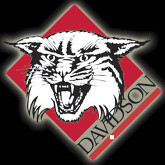
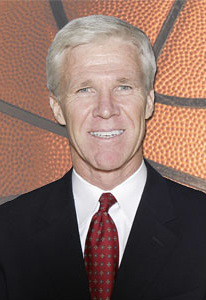
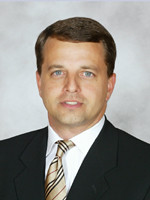

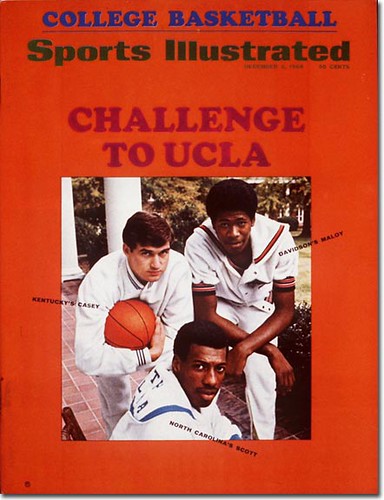
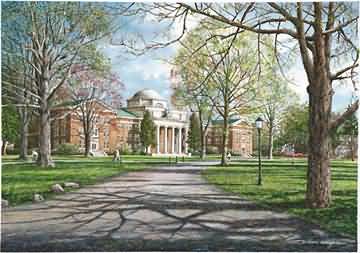
No comments:
Post a Comment